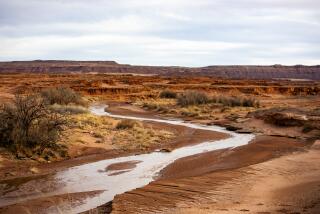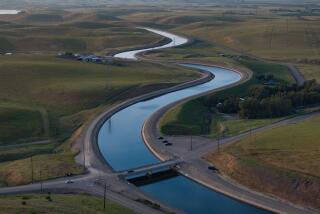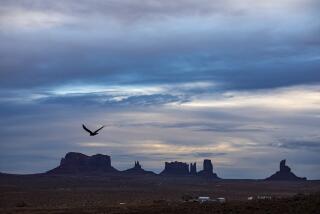In South Africa, volunteer water deliveries bring relief to drought areas
Reporting from SENEKAL, South Africa — The tatty, faded umbrellas bob above a long queue of people, protection not against rain, but the parching sun. In what some farmers are calling the worst drought they’ve seen, residents in many rural townships saw the water in their taps dribble and die months ago.
Crops didn’t get planted. Wildlife disappeared. Cattle were sent away to early slaughter when farmers couldn’t bear to watch their slow, dry deaths.
El Niño’s path across Africa has been a punishing mirror image of its march up the Pacific in the Western Hemisphere: pockets of flooding in places such as Somalia and Kenya, and here in the south, an endless succession of days so dry that water, even simple municipal drinking water, has become a precious commodity. Government officials are sending tap water by truck to thirsty outlying communities in a massive drive across the country.
People are in dire need. It’s heartbreaking. What you see there will bring tears to your eyes.
— Salman Seeday, water delivery volunteer
Salman Seeday, a volunteer who delivered water recently to this remote town in Free State province near the Lesotho border, described how people ran toward the arriving trucks, grabbed the bottles that were offered and guzzled down the contents.
“Within two or three minutes we had a queue of two or three thousand people,” he said. “People are in dire need. It’s heartbreaking. What you see there will bring tears to your eyes.”
El Niño, the cyclical warming of the equatorial Pacific Ocean, has started to relieve the long-running drought in the western United States even as, on the other side of the world, it has created a new one in Africa.
Here in the continent’s most industrialized nation and second-biggest economy, the availability of drinking water has become, in many places, an emergency. Five of South Africa’s nine provinces have been declared disaster zones, as well as areas of two other provinces. The country, which normally exports corn to much of southern Africa, will have to import up to 6 million tons of grain, according to Agriculture Minister Senzeni Zokwana.
One farmer in Eastern Cape province committed suicide this month, as the country dried up and his cattle died. There have been violent fights over water in some towns, according to Yaseen Theba, who set up Operation Hydrate, one of several voluntary water delivery efforts.
Sello Moletsane, 22, and his sister Nthabiseng, 29, of Senekal’s Tambo settlement got up at dawn to queue with four buckets for water sent in by municipal tanker. Eight hours later they were some of the last people to get water. They trundled up the dusty street with just two full buckets in their wheelbarrow. There wouldn’t be any more water for two days.
“We have to wake up at 12 o’clock at night for the queue. Sometimes we sleep here,” said Vinus Nkala, 36, who lives with her three children on the outskirts of Senekal, a parched town with peeling-paint facades and listless people hanging outside the liquor store.
Water delivered by the local municipality was “muddy” and had given some children diarrhea, so people were afraid to use it for drinking, said Nkala, who has witnessed fistfights and screaming matches over water in the queues. After the first rain in months fell on a recent Monday, people rushed with buckets to collect the dirty water for washing clothes.
The voluntary water trucking efforts began late last month.
“In the Free State, there’s only a trickle of water coming out of the taps. They’re just dropping off their cattle at the abattoirs. They can’t slaughter them fast enough. There’s no feed,” said Caroline van Saasen, who works for the Chamber of Commerce in the town of Middelburg in Mpumalanga province.
She set up a Facebook page to arrange donated water deliveries and was overwhelmed when 20,000 people signed up as volunteers within a few days. Members of the group arrange their own deliveries, trucking water across the country in bottles or tankers. Van Saasen said more than 317,000 gallons have been delivered since the project started late last month.
“There’s so much [water] transport running all over South Africa that I can’t tell you what is going where,” Van Saasen said.
A South African security company manager, who goes only by the name of Theba, has been trucking water donated by South African companies. His operation delivered more than 26,000 gallons of water to Senekal on Thursday. A long line formed instantaneously under the blazing sun as the trucks pulled up.
“We couldn’t not do it. We could not sit back and watch people die and kill people out of thirst,” he said.
“We needed to get water to people as quickly as possible. We are totally aware of the fact that this is not the most practical solution. But the people need water now. You can see the queues. And while we’re getting a project together to put tanks into these areas, at least we can get water to the people.”
Free State is one of the five provinces that have been declared a disaster zone. Parched paddocks stretch into the distance, unplanted. A gust of wind whips up a cloud of red dust. Dams and rivers are dry. Thin cattle huddle around a small pool. The little rain that has arrived came too late for planting.
The crisis has forced welfare recipients to spend a good portion of their monthly grants on water. Nkala, the mother of three, said she was forced to buy the cheapest food she could find. Many people usually grow food in small plots, but the drought has forced most to buy all their food.
“I never seen anything like this in my life. We never felt we could experience this thing,” said Maduna Nkosama, 27, of Senekal. His family of nine was too poor to buy water and instead has been relying on municipal tankers — with their dubious water supplies.
“We don’t know where the municipality got that water. That water is not good enough, especially for the kids. Some kids have been getting sick,” Nkosama said. Some townsfolk are angry that farmers bringing water tanks there were charging 60 cents for 5 gallons of water.
See more of our top stories on Facebook >>
“It’s not fair. If you have something, why don’t you contribute to other people, to show mercy?” Nkosama said. “Some people take advantage of us because of our suffering.”
Critics say the water crisis points up the national government’s failure to invest in water infrastructure, while others complain municipal governments haven’t responded effectively to the crisis.
“They should have built more dams,” said Nkala. “I’m very angry at the municipality. The community are many, but the dams are few. I won’t vote again. No more.... We are not getting help, so I don’t see any point.”
Follow @RobynDixon_LAT for news from Africa.
ALSO
Bizarre birth defect is on the rise, and researchers are baffled
Wireless-only phone users have become a one-stop shop for scam callers
What a 10,000-year-old massacre can tell us about the origins of human violence
More to Read
Sign up for Essential California
The most important California stories and recommendations in your inbox every morning.
You may occasionally receive promotional content from the Los Angeles Times.









